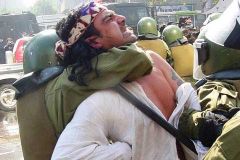



The Inter-American Commission on Human Rights (IACHR) spoke out against human rights violations in the Araucanía region in south-central Chile on Thursday, calling on the government to investigate the chain of events last week resulting in the injuries of two minors by police bullets.
 Ongoing clashes between Carabineros and Mapuches who reject encroachment of ancestral lands
Ongoing clashes between Carabineros and Mapuches who reject encroachment of ancestral lands
“The IACHR urges the state to investigate the facts and sanction those responsible, and to adopt measures in order to avoid in the future the excessive use of force in these operations,” the statement said.
The IACHR also urged the Chilean government “to adopt special measures of protection of children in this type of police action.”
Last week’s incident was the result of an eviction by police of 12 indigenous Mapuche protesters from the La Romana and Montenegro forestry plantations, which they had occupied. After protesters were transported to a nearby hospital, another scuffle broke out between Carabineros, Chile’s uniformed police, and other Mapuches who were at he hospital to visit the detained protesters. In the struggle, a 12- and 16-year-old were hit by police buckshot.
The IACHR declaration also said that on the way to the hospital, the protesters “allegedly suffered humiliation, were beaten and sexually abused by the Carabineros”.
Violent confrontations such as these are not uncommon in the Araucanía region. According to figures from the regional district attorney’s office, 95 violent acts were registered in the region in the first five months of 2012, nearly triple the amount registered over the same period the year before. Many of these acts, such as last week’s occupation, are Mapuche protests carried out against private corporations, especially agricultural and forestry companies, which many Mapuches consider to be encroaching on their ancestral land.
This incident, coupled with the subsequent resolution by the government to increase police presence in the region, drew particular national and international attention. In the following days, opposition politicians requested a human rights observer from the UN South American High Commission of Human Rights and National Institute of Human Rights (INDH) Director Lorena Fries travelled to the region to produce a report on the situation.
Mapuche protesters also peacefully occupied the regional Unicef office, demanding the withdrawal of police forces from the region.
By Helen Cordery and David Pedigo
Source: The Santiago Times, August 6th, 2012